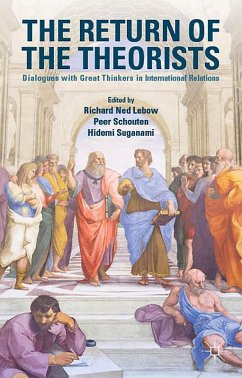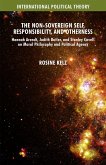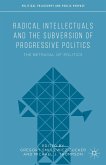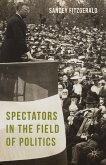The Return of the Theorists
Dialogues with Great Thinkers in International Relations
Herausgegeben:Lebow, Richard Ned; Schouten, Peer; Suganami, Hidemi
The Return of the Theorists
Dialogues with Great Thinkers in International Relations
Herausgegeben:Lebow, Richard Ned; Schouten, Peer; Suganami, Hidemi
- Gebundenes Buch
- Merkliste
- Auf die Merkliste
- Bewerten Bewerten
- Teilen
- Produkt teilen
- Produkterinnerung
- Produkterinnerung
This edited volume brings back key thinkers whose work is foundational for the discipline of International Relations. International Relations is as much a conversation with the living as with the dead, and The Return of the Theorists presents forty dialogues with key thinkers that shaped the field, conducted by renowned contemporary IR scholars.
Andere Kunden interessierten sich auch für
![Civil Society Civil Society]() John Hall / Frank TrentmannCivil Society63,99 €
John Hall / Frank TrentmannCivil Society63,99 €![The Non-Sovereign Self, Responsibility, and Otherness The Non-Sovereign Self, Responsibility, and Otherness]() Rosine KelzThe Non-Sovereign Self, Responsibility, and Otherness105,99 €
Rosine KelzThe Non-Sovereign Self, Responsibility, and Otherness105,99 €![Radicals and Reactionaries in Twentieth-Century International Thought Radicals and Reactionaries in Twentieth-Century International Thought]() Radicals and Reactionaries in Twentieth-Century International Thought41,99 €
Radicals and Reactionaries in Twentieth-Century International Thought41,99 €![Applying Rawls in the Twenty-First Century Applying Rawls in the Twenty-First Century]() M. CarcieriApplying Rawls in the Twenty-First Century81,99 €
M. CarcieriApplying Rawls in the Twenty-First Century81,99 €![Radical Intellectuals and the Subversion of Progressive Politics Radical Intellectuals and the Subversion of Progressive Politics]() Radical Intellectuals and the Subversion of Progressive Politics41,99 €
Radical Intellectuals and the Subversion of Progressive Politics41,99 €![Spectators in the Field of Politics Spectators in the Field of Politics]() Sandey FitzgeraldSpectators in the Field of Politics41,99 €
Sandey FitzgeraldSpectators in the Field of Politics41,99 €![Power, Knowledge, and Dissent in Morgenthau's Worldview Power, Knowledge, and Dissent in Morgenthau's Worldview]() Felix RöschPower, Knowledge, and Dissent in Morgenthau's Worldview81,99 €
Felix RöschPower, Knowledge, and Dissent in Morgenthau's Worldview81,99 €-
-
-
This edited volume brings back key thinkers whose work is foundational for the discipline of International Relations. International Relations is as much a conversation with the living as with the dead, and The Return of the Theorists presents forty dialogues with key thinkers that shaped the field, conducted by renowned contemporary IR scholars.
Produktdetails
- Produktdetails
- Verlag: Palgrave Macmillan / Palgrave Macmillan UK / Springer Palgrave Macmillan
- Artikelnr. des Verlages: 978-1-137-51644-2
- 1st ed. 2016
- Seitenzahl: 404
- Erscheinungstermin: 30. November 2015
- Englisch
- Abmessung: 222mm x 145mm x 27mm
- Gewicht: 615g
- ISBN-13: 9781137516442
- ISBN-10: 1137516445
- Artikelnr.: 43600246
- Herstellerkennzeichnung Die Herstellerinformationen sind derzeit nicht verfügbar.
- Verlag: Palgrave Macmillan / Palgrave Macmillan UK / Springer Palgrave Macmillan
- Artikelnr. des Verlages: 978-1-137-51644-2
- 1st ed. 2016
- Seitenzahl: 404
- Erscheinungstermin: 30. November 2015
- Englisch
- Abmessung: 222mm x 145mm x 27mm
- Gewicht: 615g
- ISBN-13: 9781137516442
- ISBN-10: 1137516445
- Artikelnr.: 43600246
- Herstellerkennzeichnung Die Herstellerinformationen sind derzeit nicht verfügbar.
Richard Ned Lebow is Professor of International Political Theory in the War Studies Department of King's College London, Bye-Fellow of Pembroke College, University of Cambridge and the James O. Freedman Presidential Professor (Emeritus) of Government at Dartmouth College. His most recent publications are Franz Ferdinand Lives: A World Without World War I, Constructing Cause in International Relations and, co-authored with Simon Reich, Goodbye Hegemony! Rethinking America's Role in the World (all titles published in 2014). Peer Schouten is a postdoctoral researcher at the Danish Institute for International Studies and editor-in-chief of Theory Talks. He works on issues ranging from International Relations Theory to mining-related conflicts in Central Africa. Hidemi Suganami was Professor of the Philosophy of International Relations at Keele before joining Aberystwyth University in 2004. His major works include The Domestic Analogy and Word Order Proposals (1989); On the Causes of War (1996); and, with Andrew Linklater, The English School of International Relations (2006).
Introduction; The Editors
1. Homer (c. 850 BCE); Richard Ned Lebow
2. Conversations with Confucius (551-479 BCE); Pichamon Yeophantong
3. Lao Zi (6th-5th century BCE?): Dao of International Politics; Chen Yudan
4. Thucydides (c.460 - c. 395 BCE): A Theorist for All Time; Richard Ned Lebow
5. Discussing War with Plato (429 - 347 BCE); Christopher Coker
6. Aristotle (384 - 322 BCE): The Philosopher and the Discipline; Anthony F Lang, Jr.
7. Two Realisms of Niccolò Machiavelli (1469 - 1527) ; Erica Benner
8. Thomas Hobbes (1588 - 1679) ; Michael C. Williams
9. An Interview with John Locke (1632-1704) ; Beate Jahn
10. Two Days in the Life of 'Dave' Hume (1711 - 1776) ; Hidemi Suganami
11. The Dangers of Dependence: Sultan's Conversation with his Master Jean-Jacques Rousseau (1712-1778); David Boucher
12. Immanuel Kant (1724 -1804): A Little Kantian 'Schwaermerei'; Friedrich Kratochwil
13. A Fine Bromance: Immanuel Kant (1724 - 1804) and Niccolò Machiavelli (1469 - 1527) ; Seán Molloy
14. G.W.F. Hegel (1770 -1831) and International Relations; Richard Beardsworth
15. A Brief Encounter with Major-General Carl von Clausewitz (1780 - 1831); Jan Willem Honig
16. A Conversation with Karl Marx (1818 - 1883) on why there is no Socialism in the United States; Joshua Simon
17. Friedrich Nietzsche (1844 - 1900); Tracy B. Strong
18. Émile Durkheim (1858 - 1917); Bertrand Badie
19.Theory Talk #-100: John Dewey (1859 - 1952) on the Horror of Making his Poetry Public; Christian Bueger and Peer Schouten
20. Max Weber (1864 - 1920); Richard Ned Lebow
21. The Republic of Norman Angell (1872 - 1967): A Dialogue (with apologies to Plato); Lucian Ashworth
22. Functionalism in Uncommon Places: Electrifying the Hades with David Mitrany (1888 - 1975); Jens Steffek
23. Dialogue with Arnold Wolfers (1892 - 1968); James W. Davis
24. E. H. Carr (1892 - 1982); Mick Cox
25. Modernity, Technology and Global Security: A Conversation with Lewis Mumford (1895-1990); Rens van Munster and Casper Sylvest
26. More Fragments of an Intellectual Biography: Hans J. Morgenthau (1904-1980); William E. Scheuerman
27. The Return of the Spectateur Engagé: Interview with Raymond Aron (1905 - 1983); Ariane Chebel d'Appollonia
28. Hannah Arendt (1906 - 1975); Kimberly Huntchings
29. Interview with John Herz (1908 - 2005); Andrew Lawrence
30. Interview with Charles P. Kindleberger (1910 - 2003), The Reputed Progenitor of Hegemonic Stability Theory; Simon Reich
31. Karl Deutsch (1912 - 1992) Interviewed; Andrei Markovits
32. International Theory beyond the Three Traditions: A Student's Conversation with Martin Wight (1913 - 1972); Ian Hall
33. John Rawls (1921 - 2002); Huw L. Williams
34. The Spirit of Susan Strange (1923-1998); Louis Pauly
35. Questioning Kenneth N. Waltz (1924 - 2013); HidemiSuganami and Adam Humphreys
36. Frantz Fanon (1925-1961); Rita Abrahamsen
37. Deep Hanging Out with Michel Foucault (1926-1984); Iver Neumann
38. Interviewing Pierre Bourdieu (1930 - 2002) about Pierre Bourdieu and International Relations; Anna Leander
39. Hedley Bull (1932 - 1985); Robert Ayson
40. Jean Bethke Elshtain (1941 - 2013): A Woman's Refuge, Baghdad, Summer 2015; Caroline Kennedy-Pipe
Conclusions; The Editors
1. Homer (c. 850 BCE); Richard Ned Lebow
2. Conversations with Confucius (551-479 BCE); Pichamon Yeophantong
3. Lao Zi (6th-5th century BCE?): Dao of International Politics; Chen Yudan
4. Thucydides (c.460 - c. 395 BCE): A Theorist for All Time; Richard Ned Lebow
5. Discussing War with Plato (429 - 347 BCE); Christopher Coker
6. Aristotle (384 - 322 BCE): The Philosopher and the Discipline; Anthony F Lang, Jr.
7. Two Realisms of Niccolò Machiavelli (1469 - 1527) ; Erica Benner
8. Thomas Hobbes (1588 - 1679) ; Michael C. Williams
9. An Interview with John Locke (1632-1704) ; Beate Jahn
10. Two Days in the Life of 'Dave' Hume (1711 - 1776) ; Hidemi Suganami
11. The Dangers of Dependence: Sultan's Conversation with his Master Jean-Jacques Rousseau (1712-1778); David Boucher
12. Immanuel Kant (1724 -1804): A Little Kantian 'Schwaermerei'; Friedrich Kratochwil
13. A Fine Bromance: Immanuel Kant (1724 - 1804) and Niccolò Machiavelli (1469 - 1527) ; Seán Molloy
14. G.W.F. Hegel (1770 -1831) and International Relations; Richard Beardsworth
15. A Brief Encounter with Major-General Carl von Clausewitz (1780 - 1831); Jan Willem Honig
16. A Conversation with Karl Marx (1818 - 1883) on why there is no Socialism in the United States; Joshua Simon
17. Friedrich Nietzsche (1844 - 1900); Tracy B. Strong
18. Émile Durkheim (1858 - 1917); Bertrand Badie
19.Theory Talk #-100: John Dewey (1859 - 1952) on the Horror of Making his Poetry Public; Christian Bueger and Peer Schouten
20. Max Weber (1864 - 1920); Richard Ned Lebow
21. The Republic of Norman Angell (1872 - 1967): A Dialogue (with apologies to Plato); Lucian Ashworth
22. Functionalism in Uncommon Places: Electrifying the Hades with David Mitrany (1888 - 1975); Jens Steffek
23. Dialogue with Arnold Wolfers (1892 - 1968); James W. Davis
24. E. H. Carr (1892 - 1982); Mick Cox
25. Modernity, Technology and Global Security: A Conversation with Lewis Mumford (1895-1990); Rens van Munster and Casper Sylvest
26. More Fragments of an Intellectual Biography: Hans J. Morgenthau (1904-1980); William E. Scheuerman
27. The Return of the Spectateur Engagé: Interview with Raymond Aron (1905 - 1983); Ariane Chebel d'Appollonia
28. Hannah Arendt (1906 - 1975); Kimberly Huntchings
29. Interview with John Herz (1908 - 2005); Andrew Lawrence
30. Interview with Charles P. Kindleberger (1910 - 2003), The Reputed Progenitor of Hegemonic Stability Theory; Simon Reich
31. Karl Deutsch (1912 - 1992) Interviewed; Andrei Markovits
32. International Theory beyond the Three Traditions: A Student's Conversation with Martin Wight (1913 - 1972); Ian Hall
33. John Rawls (1921 - 2002); Huw L. Williams
34. The Spirit of Susan Strange (1923-1998); Louis Pauly
35. Questioning Kenneth N. Waltz (1924 - 2013); HidemiSuganami and Adam Humphreys
36. Frantz Fanon (1925-1961); Rita Abrahamsen
37. Deep Hanging Out with Michel Foucault (1926-1984); Iver Neumann
38. Interviewing Pierre Bourdieu (1930 - 2002) about Pierre Bourdieu and International Relations; Anna Leander
39. Hedley Bull (1932 - 1985); Robert Ayson
40. Jean Bethke Elshtain (1941 - 2013): A Woman's Refuge, Baghdad, Summer 2015; Caroline Kennedy-Pipe
Conclusions; The Editors
Introduction; The Editors
1. Homer (c. 850 BCE); Richard Ned Lebow
2. Conversations with Confucius (551-479 BCE); Pichamon Yeophantong
3. Lao Zi (6th-5th century BCE?): Dao of International Politics; Chen Yudan
4. Thucydides (c.460 - c. 395 BCE): A Theorist for All Time; Richard Ned Lebow
5. Discussing War with Plato (429 - 347 BCE); Christopher Coker
6. Aristotle (384 - 322 BCE): The Philosopher and the Discipline; Anthony F Lang, Jr.
7. Two Realisms of Niccolò Machiavelli (1469 - 1527) ; Erica Benner
8. Thomas Hobbes (1588 - 1679) ; Michael C. Williams
9. An Interview with John Locke (1632-1704) ; Beate Jahn
10. Two Days in the Life of 'Dave' Hume (1711 - 1776) ; Hidemi Suganami
11. The Dangers of Dependence: Sultan's Conversation with his Master Jean-Jacques Rousseau (1712-1778); David Boucher
12. Immanuel Kant (1724 -1804): A Little Kantian 'Schwaermerei'; Friedrich Kratochwil
13. A Fine Bromance: Immanuel Kant (1724 - 1804) and Niccolò Machiavelli (1469 - 1527) ; Seán Molloy
14. G.W.F. Hegel (1770 -1831) and International Relations; Richard Beardsworth
15. A Brief Encounter with Major-General Carl von Clausewitz (1780 - 1831); Jan Willem Honig
16. A Conversation with Karl Marx (1818 - 1883) on why there is no Socialism in the United States; Joshua Simon
17. Friedrich Nietzsche (1844 - 1900); Tracy B. Strong
18. Émile Durkheim (1858 - 1917); Bertrand Badie
19.Theory Talk #-100: John Dewey (1859 - 1952) on the Horror of Making his Poetry Public; Christian Bueger and Peer Schouten
20. Max Weber (1864 - 1920); Richard Ned Lebow
21. The Republic of Norman Angell (1872 - 1967): A Dialogue (with apologies to Plato); Lucian Ashworth
22. Functionalism in Uncommon Places: Electrifying the Hades with David Mitrany (1888 - 1975); Jens Steffek
23. Dialogue with Arnold Wolfers (1892 - 1968); James W. Davis
24. E. H. Carr (1892 - 1982); Mick Cox
25. Modernity, Technology and Global Security: A Conversation with Lewis Mumford (1895-1990); Rens van Munster and Casper Sylvest
26. More Fragments of an Intellectual Biography: Hans J. Morgenthau (1904-1980); William E. Scheuerman
27. The Return of the Spectateur Engagé: Interview with Raymond Aron (1905 - 1983); Ariane Chebel d'Appollonia
28. Hannah Arendt (1906 - 1975); Kimberly Huntchings
29. Interview with John Herz (1908 - 2005); Andrew Lawrence
30. Interview with Charles P. Kindleberger (1910 - 2003), The Reputed Progenitor of Hegemonic Stability Theory; Simon Reich
31. Karl Deutsch (1912 - 1992) Interviewed; Andrei Markovits
32. International Theory beyond the Three Traditions: A Student's Conversation with Martin Wight (1913 - 1972); Ian Hall
33. John Rawls (1921 - 2002); Huw L. Williams
34. The Spirit of Susan Strange (1923-1998); Louis Pauly
35. Questioning Kenneth N. Waltz (1924 - 2013); HidemiSuganami and Adam Humphreys
36. Frantz Fanon (1925-1961); Rita Abrahamsen
37. Deep Hanging Out with Michel Foucault (1926-1984); Iver Neumann
38. Interviewing Pierre Bourdieu (1930 - 2002) about Pierre Bourdieu and International Relations; Anna Leander
39. Hedley Bull (1932 - 1985); Robert Ayson
40. Jean Bethke Elshtain (1941 - 2013): A Woman's Refuge, Baghdad, Summer 2015; Caroline Kennedy-Pipe
Conclusions; The Editors
1. Homer (c. 850 BCE); Richard Ned Lebow
2. Conversations with Confucius (551-479 BCE); Pichamon Yeophantong
3. Lao Zi (6th-5th century BCE?): Dao of International Politics; Chen Yudan
4. Thucydides (c.460 - c. 395 BCE): A Theorist for All Time; Richard Ned Lebow
5. Discussing War with Plato (429 - 347 BCE); Christopher Coker
6. Aristotle (384 - 322 BCE): The Philosopher and the Discipline; Anthony F Lang, Jr.
7. Two Realisms of Niccolò Machiavelli (1469 - 1527) ; Erica Benner
8. Thomas Hobbes (1588 - 1679) ; Michael C. Williams
9. An Interview with John Locke (1632-1704) ; Beate Jahn
10. Two Days in the Life of 'Dave' Hume (1711 - 1776) ; Hidemi Suganami
11. The Dangers of Dependence: Sultan's Conversation with his Master Jean-Jacques Rousseau (1712-1778); David Boucher
12. Immanuel Kant (1724 -1804): A Little Kantian 'Schwaermerei'; Friedrich Kratochwil
13. A Fine Bromance: Immanuel Kant (1724 - 1804) and Niccolò Machiavelli (1469 - 1527) ; Seán Molloy
14. G.W.F. Hegel (1770 -1831) and International Relations; Richard Beardsworth
15. A Brief Encounter with Major-General Carl von Clausewitz (1780 - 1831); Jan Willem Honig
16. A Conversation with Karl Marx (1818 - 1883) on why there is no Socialism in the United States; Joshua Simon
17. Friedrich Nietzsche (1844 - 1900); Tracy B. Strong
18. Émile Durkheim (1858 - 1917); Bertrand Badie
19.Theory Talk #-100: John Dewey (1859 - 1952) on the Horror of Making his Poetry Public; Christian Bueger and Peer Schouten
20. Max Weber (1864 - 1920); Richard Ned Lebow
21. The Republic of Norman Angell (1872 - 1967): A Dialogue (with apologies to Plato); Lucian Ashworth
22. Functionalism in Uncommon Places: Electrifying the Hades with David Mitrany (1888 - 1975); Jens Steffek
23. Dialogue with Arnold Wolfers (1892 - 1968); James W. Davis
24. E. H. Carr (1892 - 1982); Mick Cox
25. Modernity, Technology and Global Security: A Conversation with Lewis Mumford (1895-1990); Rens van Munster and Casper Sylvest
26. More Fragments of an Intellectual Biography: Hans J. Morgenthau (1904-1980); William E. Scheuerman
27. The Return of the Spectateur Engagé: Interview with Raymond Aron (1905 - 1983); Ariane Chebel d'Appollonia
28. Hannah Arendt (1906 - 1975); Kimberly Huntchings
29. Interview with John Herz (1908 - 2005); Andrew Lawrence
30. Interview with Charles P. Kindleberger (1910 - 2003), The Reputed Progenitor of Hegemonic Stability Theory; Simon Reich
31. Karl Deutsch (1912 - 1992) Interviewed; Andrei Markovits
32. International Theory beyond the Three Traditions: A Student's Conversation with Martin Wight (1913 - 1972); Ian Hall
33. John Rawls (1921 - 2002); Huw L. Williams
34. The Spirit of Susan Strange (1923-1998); Louis Pauly
35. Questioning Kenneth N. Waltz (1924 - 2013); HidemiSuganami and Adam Humphreys
36. Frantz Fanon (1925-1961); Rita Abrahamsen
37. Deep Hanging Out with Michel Foucault (1926-1984); Iver Neumann
38. Interviewing Pierre Bourdieu (1930 - 2002) about Pierre Bourdieu and International Relations; Anna Leander
39. Hedley Bull (1932 - 1985); Robert Ayson
40. Jean Bethke Elshtain (1941 - 2013): A Woman's Refuge, Baghdad, Summer 2015; Caroline Kennedy-Pipe
Conclusions; The Editors








